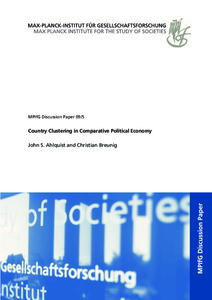Country clustering in comparative political economy

Ahlquist, John S. ; Breunig, Christian
Max-Planck-Institut für Gesellschaftsforschung, Köln
MPIfG - Köln
2009
39 p.
classification ; economic policy ; market economy ; planned economy
MPIfG Discussion Paper
5
Economic development
English
Bibliogr.
"In the comparative political economy of rich democracies there is a long tradition of classifying countries into one of a small number of categories based on their economic institutions and policies. The most recent of these is the Varieties of Capitalism project, which posits two major clusters of nations: coordinated and liberal market economies. This classification has generated controversy. We leverage recent advances in mixture model-based clustering to see what the data say on the matter. We find that there is considerable uncertainty around the number of clusters and, barring a few cases, which country should be placed in which cluster. Moreover, when viewed over time, both the number of clusters and country membership change considerably. As a result, arguments about who has the "right" typology are misplaced. We urge caution in using these country classifications in structuring qualitative inquiry and discourage their usage as indicator variables in quantitative analysis, especially in the context of time-series cross-section data. We argue that the real value of both Esping-Andersen's work and the Varieties of Capitalism project consists of their theoretical contributions and heuristic classification of ideal types."
Digital
The ETUI is co-funded by the European Union. Views and opinions expressed are however those of the author(s) only and do not necessarily reflect those of the European Union or the ETUI.